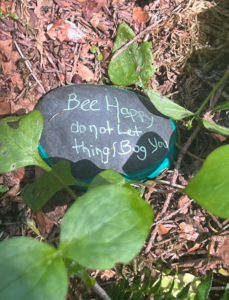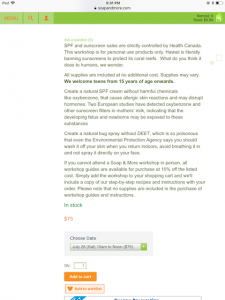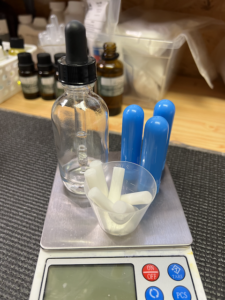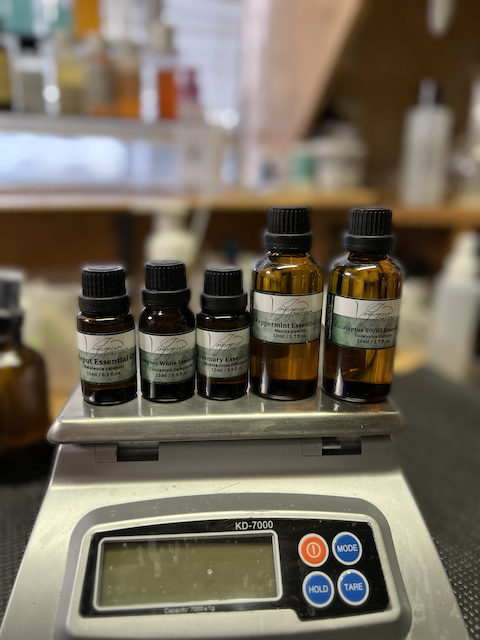Every year I beg you not to make your own sunscreen – read the most recent post here – but this year, it’s all about making bug repellents, which is pretty scary. (And again this year as well. Sigh…)
We don’t make sunscreen at home as it’s considered a drug for which you must go through extensive testing to make sure it works.
And we don’t make bug repellents at home because it’s a pesticide that must go through extensive testing to make sure it works.
This first came to my attention a few years ago when a company called Drake Apothecary was in the news because Health Canada was forcing her to recall her insect repellant – the second version of this product – because…
In order to manufacture and distribute an insect repellent, the product must first be registered by the Pest Management Regulatory Agency (PMRA), which requires a series of stages,” a Health Canada Pest Officer wrote in an email to Marino. “When pest control products are registered, the risks posed by the use of a product are fully assessed and appropriate labelling is established.”
The owner of Drake Apothecary, Michelle Marino, was selling a product for which there was no proof of it working to repel insects.
After two years of testing different formulas, she found one that worked.“I’m not a chemist or a scientist, but for whatever reason, it worked,” she said. “We never got bit anymore when we were wearing it.”
This is not testing. This is trying stuff and making associations. Testing is ensuring it works by going through the tests Health Canada requires.
If you say things like, “We aren’t sure why it’s working” or “We never got bit (sic)…when we were wearing it”, those aren’t tests. (And if you have no idea how to formulate, you shouldn’t be doing that either!)
 For the last twenty years, somewhere on my person I have carried my anti-leopard, red panda, and mouse rock (my LRPM), and I have never been attacked by leopards, red pandas, or mice.
For the last twenty years, somewhere on my person I have carried my anti-leopard, red panda, and mouse rock (my LRPM), and I have never been attacked by leopards, red pandas, or mice.
Thus, the LRPM is a rousing success and works to repel these mammals. Why can’t I sell my LRPM to people? I’ve confirmed it’s a mammal repellant because I haven’t been attacked.
*Thank goodness I have this rocks because it means the leopards won’t eat my face! (Watch this video for an awesome version of this song! Seriously, this dish is helping me keep my sanity in this crazy year, 2025.)
Drake Apothecary was the first one this year I noticed, but there have been so many more selling these sprays. We had a massive debate on the Soap & Lotion Makers of Canada Facebook page – which the posters deleted, so cowardly – about this topic the other day, and people think that putting a few essential oils into some coconut oil is a bug repellant. It isn’t!
 Worse yet, there are companies like Calgary’s Soap & More teaching classes on making both these products! (I did write to her about the class, and it appears she isn’t advertising it any more.)
Worse yet, there are companies like Calgary’s Soap & More teaching classes on making both these products! (I did write to her about the class, and it appears she isn’t advertising it any more.)
As someone who reacts pretty severely to mosquito bites – I did a presentation once with my left hand so swollen, every single child asked what happened to my hand – I would be furious if I bought something like this and it failed.
But that’s small potatoes when you consider what kinds of illnesses you can get from insect bites, like Lyme disease*, West Nile, Zika, malaria, and worse.
*Yay, Lyme disease has been found in my postal code! Hooray! 🤬
If I make a crappy shampoo, the worst thing that happens is a bad hair day.
If I make a crappy bug repellant, you could suffer for life or die.
This is serious stuff, and it seems there’s an inverse correlation between those who make bug sprays and their formulating knowledge and expertise. Those who know enough to make things like sunscreen and insect repellants know enough not to make them unless the final product were to be tested.
 Yes, you can research various essential oils to see what might work in a product, but that’s only theory, and – I can’t stress this enough – a bug repellant is a pesticide, and we don’t make pesticides in our homes.
Yes, you can research various essential oils to see what might work in a product, but that’s only theory, and – I can’t stress this enough – a bug repellant is a pesticide, and we don’t make pesticides in our homes.
Remember how we all though citronella candles worked to chase away insects? Yeah, we were wrong about that. This summary of a study noted that lemon eucalyptus oil chased them away, but there’s no information on how much was used or how large the study was. Interesting thing to think about, though…
I know there will be those who want to argue this point with me – I saw someone the other day going on about “Big Brother” telling us how to think or that all of this is to prevent little companies from making money, and if you believe that and continue to buy pesticides and drugs from sellers at the farmers’ markets, have at it – but there are no valid arguments you can make at this point, unless you’ve had your product tested and approved by Health Canada (or other regulatory bodies). If you want to make something for yourself, go ahead, I can’t stop you, but that’s not a valid argument for others making or selling these products.
Insect repellents are serious business! Please check out this page from Health Canada for all kinds of good information on this topic, such as ingredients you might want to look for and how to find a registration number. (Thanks, Liz and Barbara for this!)

